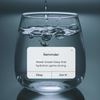
Why Hydration is Crucial for Physical and Mental Health
, by Paul Walker, 3 min reading time

, by Paul Walker, 3 min reading time
Water is the essence of life, making up about 60% of the human body. Despite its ubiquity, many people underestimate the importance of staying properly hydrated. Hydration plays a vital role in maintaining both physical and mental health, impacting everything from energy levels to cognitive function. Here’s a closer look at why water is essential for your overall well-being.
Optimal Body Functioning
Water is involved in almost every bodily process, including digestion, circulation, and temperature regulation. Proper hydration ensures that your organs and cells operate efficiently, promoting overall health.
Energy and Performance
Dehydration can lead to fatigue and diminished physical performance. Whether you're working out or simply going about your day, staying hydrated helps maintain energy levels and prevents muscle cramps or joint pain.
Skin Health
Water keeps your skin moisturized from the inside out, reducing dryness and maintaining elasticity. Proper hydration can give your skin a healthy, glowing appearance.
Detoxification
Water supports kidney function by flushing out toxins from the body. Adequate hydration reduces the risk of kidney stones and urinary tract infections, keeping these systems in good shape.
Digestive Health
Water is essential for proper digestion and preventing constipation. It helps dissolve nutrients and facilitates their absorption into the body.
Enhanced Brain Function
Even mild dehydration can impair cognitive functions like memory, attention, and problem-solving. Staying hydrated ensures your brain receives the oxygen and nutrients it needs to function at its best.
Mood Regulation
Dehydration is linked to mood swings, irritability, and increased feelings of anxiety or stress. Drinking enough water can help stabilize your mood and improve your overall emotional state.
Improved Concentration
Lack of water can lead to mental fatigue, making it harder to focus. Proper hydration keeps you sharp and alert throughout the day.
Better Sleep
Hydration affects your body's ability to regulate temperature, which can influence your sleep quality. Drinking enough water during the day can lead to more restful nights.
Dehydration can manifest in several ways, including:
If you notice these symptoms, it’s time to increase your water intake.
The common recommendation is to drink eight 8-ounce glasses of water a day (about 2 liters), but individual needs vary. Factors such as activity level, climate, and overall health can influence how much water your body requires. Listening to your body and drinking when thirsty is a good starting point.
Carry a Reusable Water Bottle
Having water on hand makes it easier to sip throughout the day.
Eat Water-Rich Foods
Fruits and vegetables like cucumbers, watermelon, and oranges contribute to your daily water intake.
Set Reminders
Use apps or alarms to prompt you to drink water regularly, especially if you tend to forget.
Flavor Your Water
Add a splash of lemon, mint, or cucumber to make plain water more appealing.
Hydration is not just about quenching thirst; it’s about nurturing your body and mind. By prioritizing water intake, you can enhance your physical health, boost your mental clarity, and improve your quality of life. Make hydration a habit—it’s one of the simplest yet most impactful steps toward overall wellness.